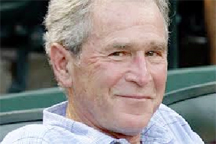(DALLAS, (Reuters) – Former Presi-dent George W. Bush underwent successful surgery at a Dallas hospital on Tuesday to place a stent in a blocked heart artery.

Doctors discovered a blockage on Monday during Bush’s annual physical at the Cooper Clinic in Dallas and recommended a stent, a wire mesh coil used to prop open arteries, a Bush spokesman said.
The former president, 67, underwent surgery yesterday morning at Texas Health Presbyterian Hospital and was “in high spirits, eager to return home tomorrow and resume his normal schedule on Thursday,” spokesman Freddy Ford said in a statement.
Bush never experienced any symptoms, and the blockage was detected because his physical included a stress test and electrocardiogram, according to an aide who asked not to be identified. Those results prompted a computerized tomography angiogram, which led to the discovery of the blockage, the aide said.
Bush exercised regularly during his two terms in the White House, from 2001 to 2009, preferring to run before knee pain led him to do more bicycling.
Since leaving office, Bush has kept up his exercise regimen, regularly riding his mountain bike, golfing and working out almost daily in a home gymnasium, the aide said.
“I love exercise,” Bush said in a video for Physical Fitness Month in 2007.
He has been active in recent months, dedicating his presidential library and traveling to Africa. Bush has also become an avid painter.
Several factors besides fitness influence a person’s risk of heart disease, including high blood pressure, high cholesterol, smoking, stress and family history, according to the American Heart Association.
Typically, the procedure Bush underwent involves inserting a narrow, balloon-tipped tube with the stent through a puncture in the arm or thigh and snaking it through the vascular system and into the heart.
The procedure takes about 45 minutes to an hour, and most patients go home six to eight hours after a simple case, said Dr. Annapoorna Kini, director of the cardiac catheterization laboratory at The Mount Sinai Medical Center in New York who was not involved in treating Bush.




